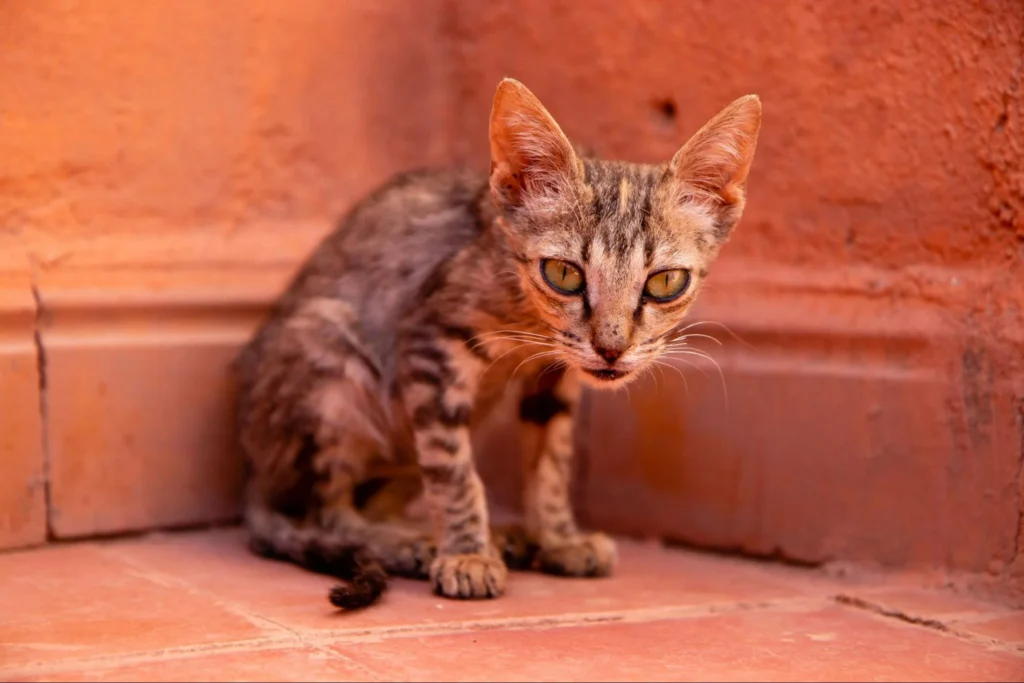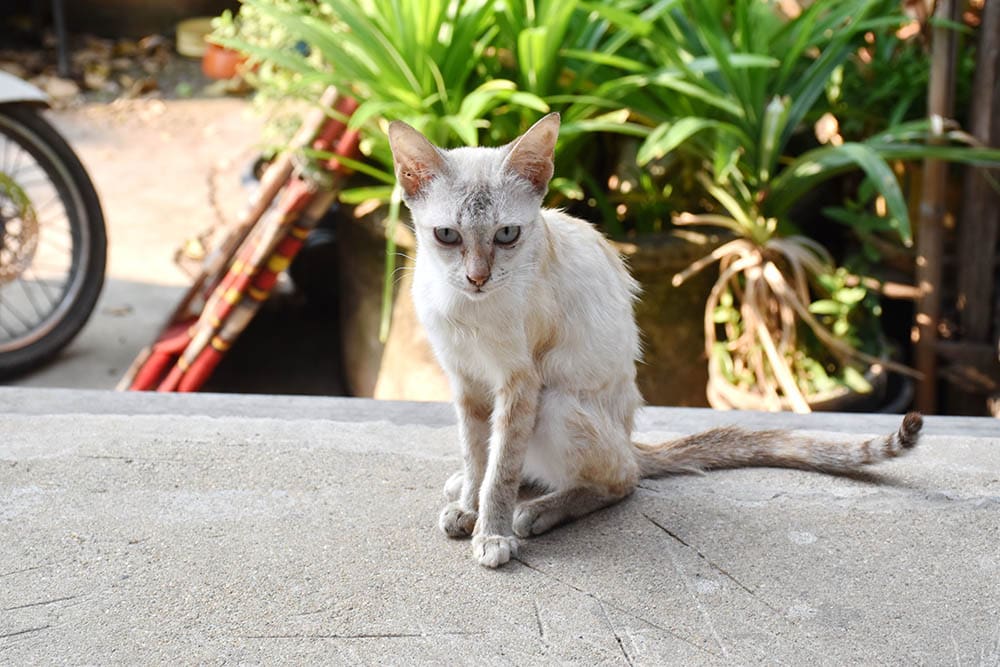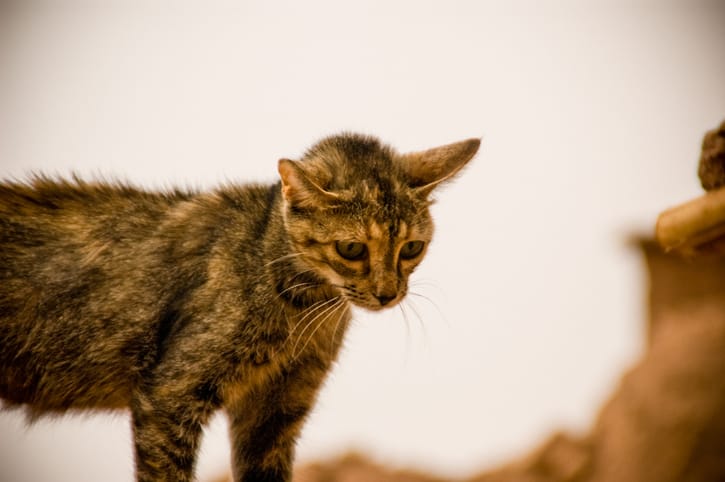Why Is My Cat Losing Weight? Vet-Backed Reasons and What You Can Do to Help

Have you recently looked at your feline friend and thought, “Huh… you’re looking a little slimmer than usual”? Maybe it’s just a trick of the light… or maybe it’s something more. If the thought why is my cat losing weight has crossed your mind more than once lately, you’re not alone—and you’re right to be concerned.
Cat weight loss can be confusing, even frustrating. Especially when everything seems normal: your kitty is still eating, still zooming around the house at 3 AM, still greeting you with head boops. So what gives?
Let’s get one thing straight: cats are masters at hiding their pain. They don’t wear their discomfort on their sleeve—or, well, fur. A small drop in their weight could be the first sign of a bigger issue brewing beneath the surface. Whether it’s sudden weight loss in cats but still eating or you’ve got an older cat losing weight slowly over time, this guide will walk you through everything you need to know, straight from the vet’s office.
Table of Contents
Understanding Cat Weight Loss: More Than Just a Slim Waistline
Sure, cats can lose weight if they’re more active or if their food intake drops. But unintentional weight loss? That’s a different story. Even a 5% change in body weight is a big deal for a cat. Imagine losing 10 pounds overnight as a human—that’s how drastic it can be for your little lion.
Veterinarian Dr. Sarah Thompson explains, “Weight loss in cats should always be taken seriously, especially when it’s sudden or unexplained. It’s often a sign that something in their system is off balance.”
Let’s break down the most common (and vet-approved) reasons behind my cat is losing weight—and more importantly, what you can do about it.
1. Hyperthyroidism: When Your Cat’s Engine Is in Overdrive
What it is:
Hyperthyroidism is like your cat running on turbo mode 24/7. It’s most common in older cats and causes the thyroid gland to produce too much hormone, speeding up their metabolism.
Symptoms to watch:
- Sudden weight loss in cats but still eating—a lot
- Drinking more water and peeing more
- Increased restlessness or activity
- Vomiting, diarrhea
- Messy, unkempt fur
Vet Insight:
Dr. Emily Rivera, a specialist in feline endocrinology, warns that “untreated hyperthyroidism can lead to heart issues or high blood pressure. Early diagnosis is crucial.”
What to do:
- Blood tests to confirm the diagnosis
- Medication like methimazole to manage hormone levels
- Radioactive iodine therapy—a one-time treatment that can cure it
- Prescription diets that limit iodine
Pro Tip: Schedule yearly bloodwork if your cat is 7+ years old. You’ll catch issues early—and potentially save their life.
2. Dental Disease: Eating Shouldn’t Hurt
What it is:
Imagine having a toothache every time you eat—and not being able to tell anyone. Dental problems like gingivitis, infected gums, or broken teeth can make eating painful, leading to unintentional cat weight loss.
Symptoms to watch:
- Bad breath
- Dropping food or chewing only on one side
- Pawing at the mouth
- Reduced food intake, but still showing interest
Vet Insight:
“Dental disease is one of the most overlooked causes of weight loss,” says Dr. James Lee, a veterinary dentist. “And yet, it’s so common.”
What to do:
- Oral exam at the vet
- Professional cleaning under anesthesia
- Tooth extractions if necessary
- Pain meds to make eating comfortable again
Pro Tip: Soft foods can help during recovery—and yes, brushing your cat’s teeth IS possible.
3. Gastrointestinal Disorders: When Food Doesn’t Fuel

What it is:
Your cat might be eating normally, but if their gut isn’t absorbing nutrients, it’s all for nothing. GI issues like inflammatory bowel disease (IBD) or intestinal parasites can lead to weight loss even when appetite seems intact.
Symptoms to watch:
- Vomiting and/or diarrhea
- Bloating or abdominal discomfort
- Sudden weight loss in cats but still eating
- Low energy or hiding behavior
Vet Insight:
“Don’t ignore consistent digestive problems,” advises Dr. Rivera. “They can lead to malnutrition, no matter how much your cat eats.”
What to do:
- Fecal tests to rule out parasites
- Dietary changes like hypoallergenic or limited-ingredient foods
- Steroids or antibiotics depending on the cause
Pro Tip: Keep a journal of your cat’s bathroom habits and food intake—it helps your vet spot patterns fast. 📓
4. Diabetes Mellitus: Sweet but Dangerous
What it is:
Yes, cats can get diabetes too. It prevents their cells from properly absorbing glucose, which means they burn fat and muscle for energy—resulting in weight loss.
Symptoms to watch:
- Always hungry, but still losing weight
- Drinking/peeing a LOT
- Lethargy
- A sweet or fruity breath odor
Vet Insight:
Dr. Maria Gonzalez says, “With proper care, diabetic cats can live long, healthy lives—but time is of the essence.”
What to do:
- Insulin injections—usually twice a day
- Low-carb diets
- Frequent monitoring of blood glucose levels
Pro Tip: Use treat time to build positive vibes around insulin shots. Reward your brave kitty with affection (and maybe a low-carb snack)! 💉🐾
5. Kidney Disease: The Silent Weight Stealer
What it is:
Chronic kidney disease (CKD) is heartbreakingly common in older cats losing weight. It creeps in slowly, reducing appetite and causing muscle loss.
Symptoms to watch:
- More frequent urination
- Increased thirst
- Poor appetite
- Vomiting
- Dull, matted coat
Vet Insight:
According to Dr. Thompson, “By the time you notice symptoms, the kidneys may have already lost significant function. Early detection is essential.”
What to do:
- Bloodwork and urine tests
- Prescription kidney diets
- Hydration therapy, like subcutaneous fluids
- Phosphate binders and anti-nausea meds
Pro Tip: Cats love moving water. A pet fountain may encourage drinking—an essential part of CKD management.
6. Cancer: A Tough Diagnosis

What it is:
No one wants to hear the word “cancer,” but unfortunately, it’s a real cause behind cat weight loss. Tumors can impact appetite or metabolism—and sometimes weight loss is the only sign something’s wrong.
Symptoms to watch:
- Unexplained or rapid weight loss
- Lumps or swollen areas
- Lethargy or behavior changes
- Vomiting or blood in stool
Vet Insight:
“While not all cancers are terminal, early detection increases options,” says Dr. Lee. “Don’t wait if you feel something isn’t right.”
What to do:
- Diagnostic imaging like X-rays or ultrasounds
- Biopsy of abnormal growths
- Surgery or chemotherapy, depending on the type
- Palliative care to maintain quality of life
Pro Tip: Your intuition matters. You know your cat best—speak up if something feels off.
7. Stress and Anxiety: The Invisible Enemy
What it is:
Cats are emotional beings. A new pet, a move, loud noises, or even furniture rearrangement can cause anxiety. And when a cat’s stressed? Eating takes a backseat.
Symptoms to watch:
- Hiding more than usual
- Acting withdrawn or aggressive
- Not finishing meals
- Overgrooming or changes in litter habits
Vet Insight:
“Stress doesn’t just affect behavior—it impacts physical health too,” explains Dr. Rivera. “Especially in sensitive cats.”
What to do:
- Pheromone diffusers like Feliway
- Consistent routines (feeding, playtime, quiet spaces)
- Environmental enrichment: climbing towers, puzzle feeders, cozy nooks
Pro Tip: Quality time makes a difference. Snuggles, play, and gentle interaction can go a long way toward helping your cat feel safe.
When to See a Vet: Don’t Wait Until It’s Too Late
Still wondering why is my cat losing weight? If you’re noticing any of the symptoms above, it’s time to call your vet. Quick checklist:
- Lost 5%+ of their body weight
- Eating normally but still slimming down
- Older cat losing weight without explanation
- Vomiting, lethargy, or behavioral changes
Remember: Cats hide their pain—vets reveal it. 🩺
Helping Your Cat Regain Weight (Safely)

Once you and your vet identify the cause, the next step is restoring your kitty’s weight—without stressing their system. Try these vet-approved strategies:
- Calorie-dense foods: Kitten food is higher in calories and great for senior cats needing a boost (with vet approval).
- Small frequent meals: More snacks, less overwhelm.
- Appetite stimulants like mirtazapine (vet prescribed only).
- Warm up wet food to make it smell extra tempting.
Weigh your cat weekly. Track what works. Celebrate small gains! 🎉
Keeping the Pounds On: Preventing Future Cat Weight Loss
The best cure? Prevention. Here’s how:
- Annual vet checkups (biannual if your cat’s older)
- Feed a balanced, age-appropriate diet
- Keep them active: playtime, vertical spaces, toys
- Minimize stress: routine, love, safety
A healthy weight = a longer, happier life.
FAQ: Your Top Questions About Cat Weight Loss Answered!
Why is my cat losing weight but still eating normally?
Sudden weight loss in cats but still eating can be a sign of conditions like hyperthyroidism, diabetes, or gastrointestinal issues. Even if your cat is munching away, their body might not be absorbing nutrients properly. Dr. Sarah Thompson, DVM, suggests, “A vet visit is crucial to run blood tests or imaging to identify the cause.” Keep an eye on other symptoms like increased thirst or vomiting, and consult your vet ASAP. 🩺
Is it normal for an older cat to lose weight?
Some weight loss in older cats losing weight can occur due to reduced muscle mass or slower metabolism, but significant or rapid weight loss is not normal. Conditions like kidney disease, hyperthyroidism, or cancer are common culprits in senior cats. Regular vet checkups and bloodwork can catch these issues early. Pro Tip: Feed senior-specific diets to support your aging kitty’s needs. 😺
How can I tell if my cat’s weight loss is serious?
If your cat loses more than 5-10% of their body weight (e.g., 0.5 lbs for a 10-lb cat) or shows symptoms like lethargy, vomiting, or appetite changes, it’s time to see a vet. “Cats are small, so even a little weight loss can be a big deal,” says Dr. Emily Rivera. Track your cat’s weight weekly using a baby scale for accuracy. 📏
Can stress cause my cat to lose weight?
Absolutely! Stress from moving, new pets, or loud noises can lead to my cat is losing weight by reducing appetite or causing overgrooming. Try calming solutions like Feliway diffusers or extra playtime. If stress persists, a vet behaviorist can help. Pro Tip: Create a cozy hideout for your cat to feel safe. 🐾
How can I help my cat gain weight safely?
Work with your vet to identify the cause of cat weight loss first. Then, try:
Offering high-calorie, vet-approved foods (e.g., kitten or recovery diets).
Feeding small, frequent meals to entice eating.
Using appetite stimulants if prescribed. Warm up wet food to make it more appealing, and monitor weight gain weekly. 😻
Can diet changes fix my cat’s weight loss?
In some cases, yes! For issues like GI problems or kidney disease, prescription diets can make a big difference. However, diet alone won’t fix underlying conditions like hyperthyroidism or cancer. Always consult your vet before changing your cat’s food. Pro Tip: Transition to new foods gradually over 7-10 days to avoid tummy upset. 🍽️
Final Thoughts: Trust Your Gut and Listen to Your Cat’s Body
Whether it’s hyperthyroidism, diabetes, or just emotional stress, the answer to why is my cat losing weight is always worth investigating. Trust your instincts. Talk to your vet. And most importantly, keep loving that whiskered little weirdo like the family they are.
Got a story about my cat is losing weight? Share it in the comments or schedule that vet appointment today. Let’s help our cats stay strong, silly, and snuggly—for many years to come. 🐈✨
Disclaimer: This article is intended for informational purposes only and does not replace professional veterinary advice. Always consult a licensed vet for diagnosis and treatment.
